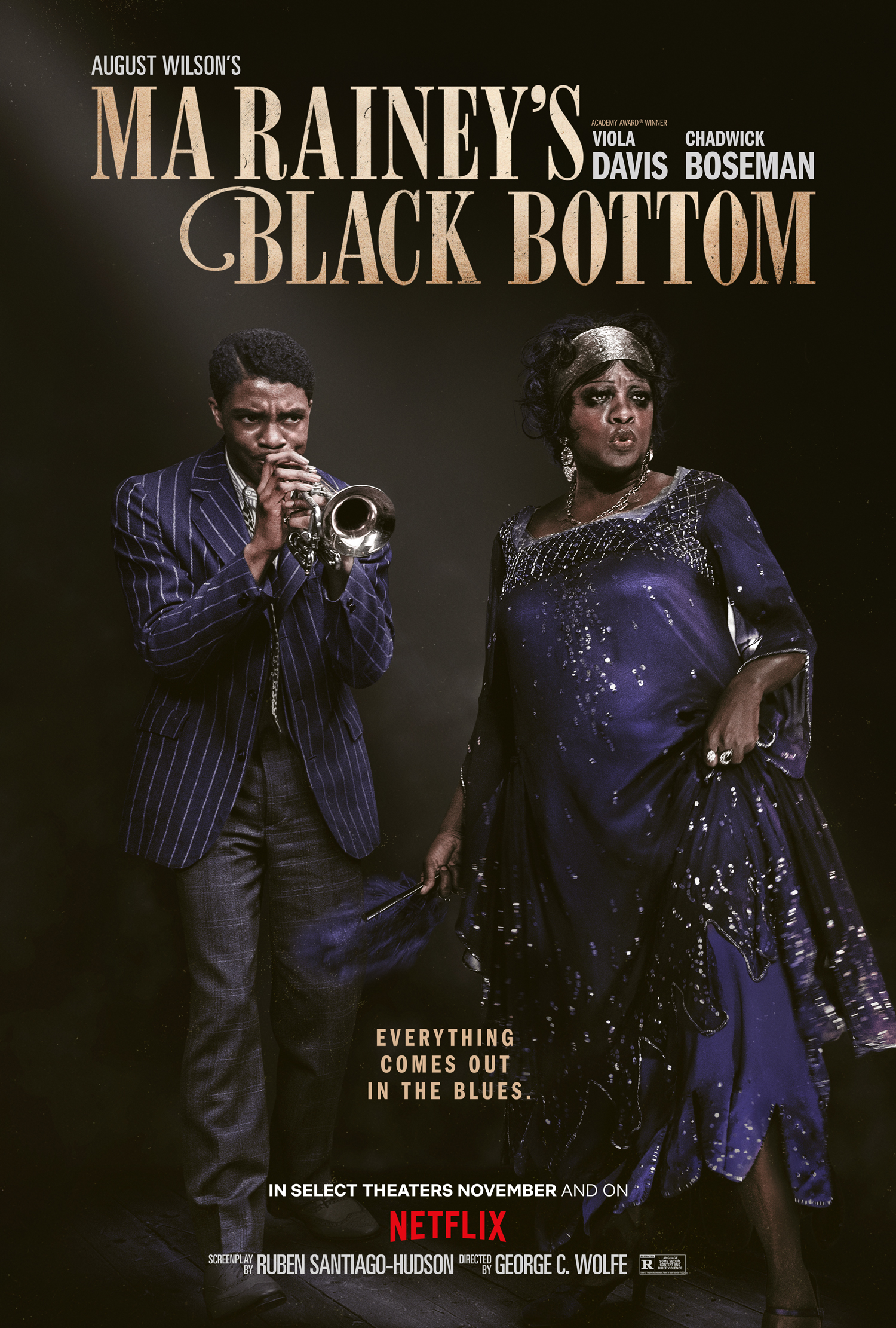
25 Nov Ma Rainey’s Black Bottom Review
BLUF: A wonderfully performed, cinematically stagnant stage play contrasting the experience of several African American musicians in 1920’s Chicago
Ma Rainey’s Black Bottom is based on a stage play written by August Wilson, with the film adaptation produced by Denzel Washington. It takes place in essentially two rooms and director George C. Wolfe makes as good a use of this limited setting as possible. But the true beating hearts of the film are the mesmerizing performances by Viola Davis and Chadwick Boseman, playing Ma Rainey and Levee, respectively.
Viola Davis’ dramatic physical transformation into the titular character cannot hide her exceptional performance, which is both searingly intense while simultaneously low-key blasé. These two qualities seem diametrically opposed, but Davis pulls it off portraying a talented singer hired to cut a record of a popular song. The circumstances of this scenario are the dramatic crux of the film: Ma Rainey is a black woman with a talent in very high demand, enough so that the white managers of the recording studio are willing to do anything she requests.
Ma’s confidence in her talent turns contemporary racial politics on their head by sheer will. There is a scene where she refuses to start recording until someone brings her a Coke, and the power she wields in this request is a microcosm of the power she has learned to wield by simply recognizing her value and compelling everyone else around her to rightfully acknowledge it and act accordingly.
On the other hand, Boseman plays Levee, the new trumpet player in her band, who has grand plans of his own. He is a talented musician and has a knack for writing great songs. But he is also temperamental and belittles the rest of the band for their lack of vision and drive. Unfortunately, Levee’s ambition conflicts with Ma, who expects him to play exactly what she wants, how she wants, no compromise. Ultimately, despite his own awful hardships, Levee has not paid his dues as a performer the way Ma Rainey has, and his story ends accordingly for one overcome by his circumstances. Ma Rainey, on the other hand, is an immovable rock, hardened by experience and her own dedication.
Ma Rainey’s Black Bottom is centered around the contrasting philosophies, actions, and motivations of Ma and Levee, and the effect on the people around them. The viewer is compelled to vacillate between each of them as you learn more about their history and/or personality. Both characters have suffered as a result of the endemic racism of the time, but Ma represents an overwhelming triumph over that hard road to accomplishment, while the much younger Levee has become surprisingly bitter and cynical, refusing to heed the wise counsel of those who seek to help him avoid their pitfalls.
Wilson’s characters as realized through Davis and Boseman are so compelling because they are so complete, demanding respect, empathy, and pity at different times. You would never feel the same range of emotions without such great characters brought to life by such great actors. The supporting characters are all excellent as well. The dank, dusty recording studio, limited as it is, takes on a life of its own when filled with characters you want to know more about.
To me, Boseman’s final cinematic performance stands as both an exceptional achievement and an unfortunate one. Boseman owns the screen every second he is on it, with a few monologues that he brings alive with his unbridled emotional engagement. It’s exceptional, particularly due to the physical challenges from his unpublicized battle with cancer.
To me, the only downside of his final role is that Boseman was known and respected as a man of faith, which was highlighted by friends and family at the time of his death. The role of Levee required Boseman to portray a man who has rejected God and curses the deity he blames for his life’s suffering. Watching the film only a few months after Boseman’s passing, and feeling inspired by our shared faith, I was shaken by the intensity of a performance that required such an intense rejection of an integral part of his real life. Of course, this can be entirely ignored by the casual viewer, but for me, given the timing of when Boseman passed and the film was released, it was difficult, and encompassed a range of emotions that were not directly tied to the film in isolation.
Nonetheless, Boseman and Davis’ performances are the cornerstones of this film, and are utterly engaging, making the entire experience worthwhile.
Pros:
- Truly outstanding performances by Chadwick Boseman and Viola Davis
- Excellent use of limited settings, per the source material as stage play
- Supporting characters are well played and utilized
- The dramatic underpinning of the film contrasts important facets of the African American experience of the time, while reflecting issues that are relevant today
Cons:
- We will never have another performance from Chadwick Boseman…
Rating: 4.5/5
Rarely do the meta-circumstances of a film benefit it, but Boseman’s passing enhances the experience of this film in many meaningful, poignant ways.
Review by Jim Washburn


No Comments